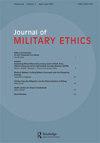An Assessment of Student Moral Development at the National Defense University: Implications for Ethics Education and Moral Development for Senior Government and Military Leaders
Q2 Arts and Humanities
引用次数: 2
Abstract
ABSTRACT Senior service colleges provide professional education to prepare military and government civilians for public service at the senior levels of strategy and policy. Inclusive in the program of study is ethics education, since various constituents expect their leaders to act in an ethical manner and to incorporate ethics and values in decision-making, policy, and strategy. In order to develop the most effective professional ethics education, the National Defense University assessed students in a pre- and post-test format using the Defining Issues Test Version 2 to determine their patterns of moral judgment at the beginning and the conclusion of the program. This article discusses the theoretical background, existing research, results, and implications of the study. Key findings include military students aligning with the Maintaining Norms schema; civilian students aligning with the Postconventional schema; and no significant changes as a result of the program. The article concludes with recommendations for ethics education for military and public service professionals. This research helps fill a void of empirical data on the moral development of military and public servants.国防大学学生道德发展评估:对政府和军队高层领导伦理教育和道德发展的启示
高级服务学院提供专业教育,为军队和政府文职人员在战略和政策的高级层面提供公共服务。在研究项目中包括道德教育,因为不同的选民期望他们的领导人以道德的方式行事,并在决策、政策和战略中纳入道德和价值观。为了开展最有效的职业道德教育,国防大学采用测试前和测试后的形式,使用定义问题测试版本2来评估学生在项目开始和结束时的道德判断模式。本文讨论了本研究的理论背景、研究现状、研究结果和研究意义。主要发现包括:军校学生符合维持规范图式;符合后传统图式的平民学生;这个项目并没有带来显著的变化。文章最后对军队和公共服务专业人员的道德教育提出了建议。这项研究有助于填补军人和公务员道德发展经验数据的空白。
本文章由计算机程序翻译,如有差异,请以英文原文为准。
求助全文
约1分钟内获得全文
求助全文

 求助内容:
求助内容: 应助结果提醒方式:
应助结果提醒方式:


